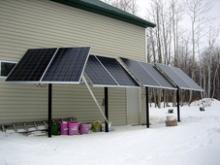"Living off the grid" is a popular fantasy, and has been for many years. It is equally popular among survivalists, back-to-the-land hippies, and the ridiculously frugal. There aren't many things for which that is true!
"Off grid" is defined as, no municipal water supply, no municipal sewage services, no municipal power lines, no cable TV, no nothing. Basically, no wires or pipes that cross your property line.
Many rural residents are halfway there already - for example, my water comes from a well, I heat exclusively by wood stove, and I'm on a septic system. (And our road was only wired for cable two years ago, which I realize doesn't count, but still.)
The final step for most people is to secure an independent power supply. Solar is the best option, even here in the Pacific Northwest we get enough juice to run an entire house - with the aid of solar batteries, of course. A gas generator as a back-up is also very common, if only as a safety net.
If you are planning to go off grid, outfitting your home for propane is almost a necessity. A propane tank can take care of your home heating, run your hot water heater, and provide you with a gas stove as well. Propane is getting more expensive every day, but considering the power draw of electric hot water heaters and stoves, it is a valuable addition.
Life off the grid is a constant set of trade-offs. You only get so much electricity each day from the solar panels. And you don't want to go outside and fire up the generator unless you have to - aside from the expense of the gas to run it, there's the smell, and the noise which can be very distracting.
You learn to budget your electricity usage in surprising ways. For example, my friend and her husband had to make the difficult decision to forego a coffee machine. Instead, they make coffee using a French press, since they can boil water atop their gas stove without having to use any electricity.
It requires some sacrifices, as well. Major appliances like a dishwasher, clothes washer, and clothes dryer are massive drains on the system. Most people who live off the grid have opted to forgo all three, washing dishes by hand, and hauling laundry to the laundromat in town instead.
You can get internet services just about anywhere these days if you have the right cell phone data plan, and an AirCard. If you work in an office, you can charge your laptop and cell phone at work. (Why not? It's free!) Their house is within range of a cell phone tower, although many remote properties are not. In which case, a satellite phone is a reasonably affordable alternative to no phone at all - and getting cheaper every day.
These sacrifices may seem major to some, but consider the benefits! She estimates that their system paid for itself after seven years. Everything since then has been gravy!
Photo credit: Flickr/Canadian Veggie
